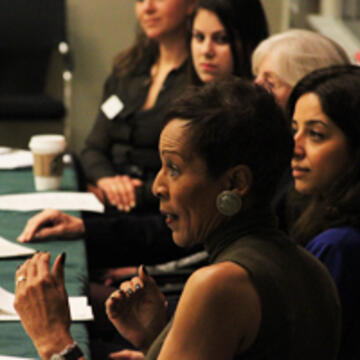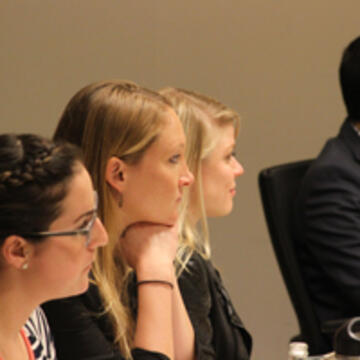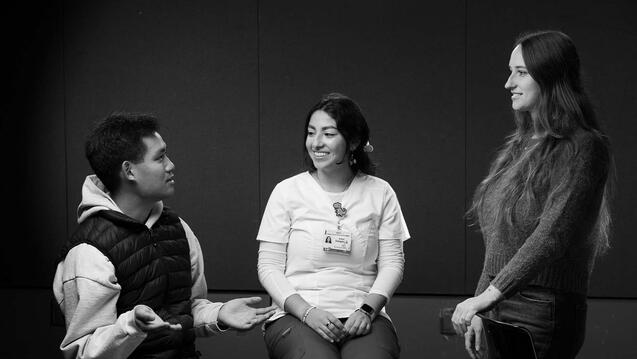
Women and Money - Looking at the Future for Millennials

Grave statistics surround the millennial generation. Did you know around forty million students in the U.S. have outstanding student loans? Or that in 2010, only 2.4% of the U.S. Fortune 500 chief executives were female?
These are just a few of the statistics recently discussed at the University of San Francisco (USF) School of Management’s Women in Finance panel. USF undergraduate and graduate students discussed ways to overcome obstacles like these to achieve the financial careers they want.
The panel featured Valerie Coleman-Morris, author of It’s Your Money so Take It Personally and former CNN Business Anchor; Terry Helm, former president of Financial Women in San Francisco (FWSF); Lea Wiviott-Borracchia, a Financial Representative with Northwestern Mutual; Mona Ahmadi, MBA ‘15 and 2014 recipient of the Financial Women of San Francisco Association Scholarship; and Mackenzie O’Donnell, a second-year Full-Time MBA and Master of Science in Environmental Management dual degree candidate at USF.
The initiative for the panel came from graduate student Mackenzie O'Donnell, who realized the necessity for the discussion after hearing her friends express their frustration over the looming amount of debt that waited for them after graduation, and the limited opportunities for women to talk about their financial future. “I noticed there was a lack of events geared towards women in business, nor a focus on answering hard questions about the industry related to women and debt,” O’Donnell said. Coming from a strong family who instilled in her the belief that anything is possible, O’Donnell contacted USF administration to create a space for young women to openly discuss the changing market and the role of women in it. O'Donnell continued, “I really want to inspire women to be excited about their prospects in any industry, but particularly to show that we can handle our own finances, despite the sexist idea that women always need a hand or a partner in a dual income household in order to make it.”
Panelists each shared the tools they acquired over the years that helped them succeed. Many stressed the importance to plan not just their professional future, but their financial future as well. “It’s never too late to create goals for your spending plans. Write down your goals, personally, professionally and financially,” Wiviott-Borracchia said.
Coleman-Morris showed the audience a small notebook she carries with her everywhere to keep her on track with her financial goals. She writes down the details of every purchase,from small coffees to paying bills, and highlights unnecessary purchases at the end of the day to challenge herself to think more critically about where her money goes on a daily basis.
The conversation then shifted to how to manage student debt. “We want the future generation to be producers of wealth, not consumers of debt,” Coleman-Morris said.
O’Donnell talked about her experience paying off student loans in 2009. “I worked hard to pay that debt off. The process was slow,” O’Donnell said. “A lot of it came down to planning how much I could pay at a time.

As the Millennial Generation is burdened with student loans and experience more difficulty in creating a financial imprint than previous generations, the panel stressed the importance of having a financial mentor and connecting with others. Terry Helm, former stockbroker and president of Financial Women in San Francisco explained how connecting with others has helped her succeed. “It’s extremely important to have a mentor and a group of women to go to for support in this field,” Helm said.
The panel emphasized that support from other women in business is crucial as the demographics of the business world continue to evolve.
More and more women are entering the workforce in every field. It used to be just the husband or father who managed our money, but now women are doing so much more,” Ahmadi said.
One tool that she said was helpful is called The Mint, which is a free app that automatically pulls all your financial information into one place, giving the user a wider picture of their expenses.
Wiviott-Borracchia expressed the importance of getting to know other women in the company. This interaction shows women coming into the workforce that it is possible for them to succeed in a male-dominated field.“It is important to take risks,” Wiviott-Borracchia said. “Don’t be afraid. Embrace it.” The panelists agreed that supporting and believing in each other is key for women to succeed in business. “Believe in each other. Remember you can do it. Live the life you want to lead and legacy you want to leave behind,” Coleman-Morris said.
by Laura Robledo


